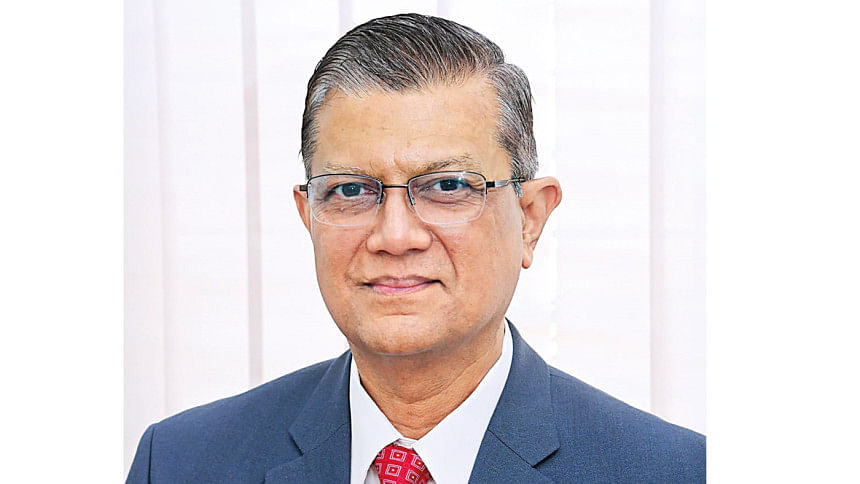Supporting MSMEs with diverse loan products

Md. Ahsan uz Zaman
Managing Director & CEO, Midland Bank
The Daily Star (TDS): How do you assess the current state of the MSME sector in Bangladesh, and what role do you think banks can play in accelerating its growth?
Md. Ahsan uz Zaman (MAZ): The MSME sector in Bangladesh plays a pivotal role in employment generation and GDP contribution, accounting for over 25% of the national GDP and significant industrial employment. However, despite its importance, the sector faces structural constraints, limited access to finance, and informal business operations.
Banks can accelerate growth by developing tailor made products, simplifying credit processes, expanding cashless banking, and fostering partnerships with fintechs. Capacity building and strategic advisory services can also enable MSMEs to become more competitive and sustainable.
TDS: What are the major challenges MSMEs face in accessing finance, and how is your bank addressing these issues—especially for micro and cottage industries?
MAZ: Key challenges include:
• Lack of formal financial records and collateral
• High perceived credit risk
• Limited awareness of financial products
• Complex loan processing and documentation
To address these, our bank has simplified credit assessment through alternative data scoring and cash flow based lending models. For micro and cottage industries, we offer unsecured loans and seasonal credit products under a linkage programme. We've also strengthened our field level presence through dedicated Relationship Officers at our Branch, Sub Branch, SME Centre and Agent Banking Centre. Besides the above services, we run mobile banking initiatives to ensure last mile delivery of financial services.
TDS: Does your bank have any dedicated products, financial literacy programmes, or credit guarantee schemes targeted at MSMEs? Please share key initiatives.
MAZ: Our bank has introduced a range of MSME Loan products including specialised products and services for MSMEs. These include loans for MSMEs with adequate land wishing to build houses for rental/commercial purposes with flexible repayment options; a women entrepreneur dedicated loan product with lower interest rates and relaxed documentation to support women led MSMEs; a start up loan facility for early stage businesses with limited assets and backed by innovative business models; a special loan product for marginalised people under the financial inclusion refinance programme; and separate loan products under various refinance and pre finance schemes of Bangladesh Bank. We are also collaborating with Bangladesh Bank's refinance schemes to reduce collateral dependency for MSMEs. We run regular financial literacy camps and workshops in rural and semi urban areas to enhance awareness and capacity among small business owners.
TDS: How has your bank leveraged technology or digital banking solutions to improve outreach and services to MSMEs, particularly in semi urban and rural areas?
MAZ: While our full fledged digital or technology based SME banking platform is currently under development, we have already taken several foundational steps to improve outreach and service delivery to MSMEs, especially in semi urban and rural areas. These include:
1. Strengthening Agent Banking and Field Force Capabilities: enhancing our agent network and training Relationship Officers (ROs) and Relationship Managers (RMs) with digital tools for customer onboarding, loan application collection and credit monitoring in underserved regions.
2. Piloting Mobile Based Loan Origination Tools: digitising SME loan origination and preliminary credit assessments to enable quicker service delivery and reduce dependency on physical branches.
3. Leveraging Existing Core Banking and CRM Platforms: integrating internal CRM and core banking systems to offer faster processing, centralised customer data and better service tracking for MSME clients.
4. Customer Awareness & Digital Readiness: conducting financial literacy campaigns and digital onboarding awareness sessions to prepare MSMEs—especially in rural areas—to adopt digital financial services once launched.
Future Roadmap:
Our upcoming digital SME banking suite aims to offer services such as online loan applications, automated credit scoring, mobile based transaction monitoring and digital document submission—tailored to the unique needs of MSMEs across diverse geographies. These innovations have not only increased MSME penetration but also enhanced credit quality through better monitoring and collection mechanisms.
TDS: What steps is your institution taking to support women led MSMEs and promote financial inclusion among underrepresented segments?
MAZ: Our bank is deeply committed to inclusive banking. Key initiatives include:
• Dedicated Women SME Desks: available at all branches to offer personalised support to female entrepreneurs.
• Special Credit Lines: with lower interest rates, longer repayment tenures, and flexible documentation for women led businesses.
• Partnerships with NGOs: ensuring timely loan disbursement to marginalised women entrepreneurs and farmers.
• Social Awareness Campaigns: promoting female entrepreneurship and inclusion through digital and community based platforms.
We closely monitor the disbursement ratio to ensure equitable access and continuously review policies to reduce gender based financial barriers.
TDS: Looking ahead, what policy reforms or collaborative efforts between banks and the government would you recommend to ensure sustainable development of Bangladesh's MSME ecosystem?
MAZ: To ensure long term sustainability, I recommend the following:
• Digitised Business Identity & Credit Scoring System: government backed unified platforms to help banks assess MSMEs more effectively.
• Expanded Credit Guarantee Programmes: with shared risk models to encourage banks to lend to new and small borrowers.
• Tax Incentives for Formalisation: to encourage MSMEs to register and maintain financial records.
• Capacity Development Programmes: joint initiatives between banks, regulators and development partners to provide entrepreneurship training.
• Infrastructure Development: reliable logistics and digital connectivity in rural areas to unlock growth for rural MSMEs.
A strong public–private partnership is essential to build a robust, inclusive and innovation driven MSME sector in Bangladesh.

 For all latest news, follow The Daily Star's Google News channel.
For all latest news, follow The Daily Star's Google News channel. 



Comments